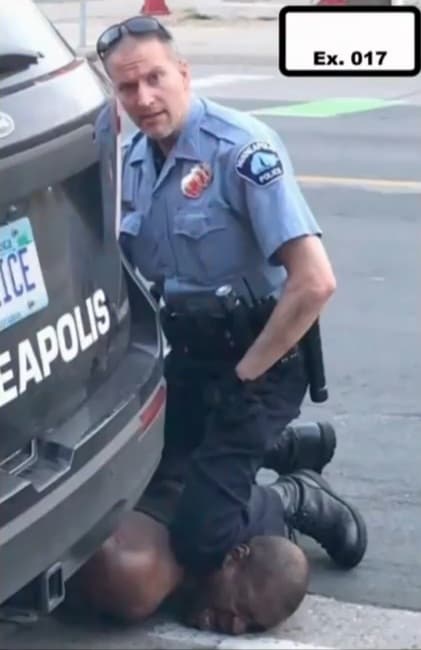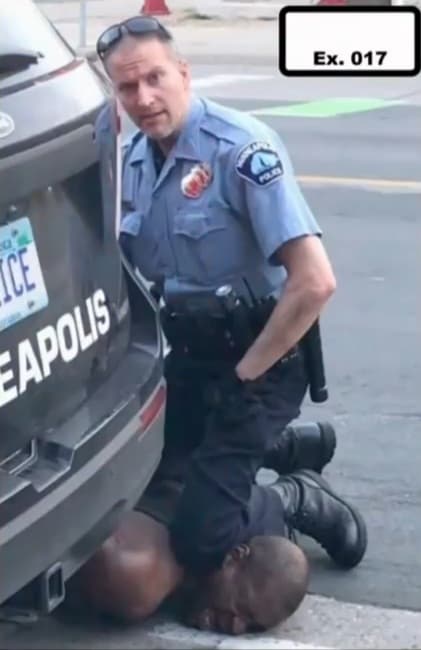‘This Was Not a Sudden Death’: Medical Experts Shed More Light on George Floyd’s Cause of Death In Week 2 of Chauvin Trial
For the past two weeks, defense attorney Eric Nelson has mounted a case that George Floyd was not killed by the weight of former Minneapolis police officer Derek Chauvin’s knee on his neck. Instead, Nelson has posited that Floyd died of a drug overdose and pre-existing heart troubles.
But prosecutors keyed in on the 47-year-old Black man’s cause of death last week and sought to deal a critical blow to Chauvin’s defense. Hennepin County Medical Examiner Andrew Baker, who conducted Floyd’s initial autopsy, took the stand Friday and said he would still classify the death as a homicide today.
Baker acknowledged under Nelson’s cross examination that hypertensive heart disease and drug use factored into Floyd’s death. But he maintained his stance that the primary cause of death was police restraint.
“My opinion remains unchanged. It’s what I put on the death certificate last June,” the medical examiner said. “It’s cardiopulmonary arrest, complicating law enforcement subdural restraint and neck compression. That was my top line then, it would stay my top line now.”
Chauvin, 45, is being tried for manslaughter as well as second- and third-degree murder charges stemming from the May 25 fatal encounter that sparked a global outcry against police brutality last summer. Chauvin and three other officers wrestled a handcuffed Floyd to the ground during an arrest outside a Cup Foods grocery store in Minneapolis, Minnesota. Chauvin knelt on Floyd’s neck for 9 minutes, 29 seconds during the ordeal.
Thomas Lane, J. Alexander Kueng, and Tou Thao, the three other then-officers involved, face charges of aiding and abetting second-degree murder and manslaughter. They are scheduled to be tried in August.
Prosecutors may rest their case as early as Monday, April 12, CBS News reports. The judge presiding over the case has estimated the trial could last up to four weeks. It’s not clear if the ex-officer will testify.
While the first week of Chauvin’s trial was underscored by emotional testimony from bystanders who witnessed the macabre encounter play out, the most explosive moments last week came from law enforcement and medical experts.
Prosecutors paraded to the stand a number of ranking police officers and investigators early in the week. One by one, they denounced the technique Chauvin used, testifying that pinning Floyd’s neck under his knee for nearly 10 minutes was a clear policy violation.
“That action is not de-escalation,” Minneapolis Police Chief Medaria Arradondo said Monday. “And when we talk about the framework of our sanctity of life, and we talk about the principles and values that we have, that action goes contrary to what we’re taught.”
The chief testified while looking at the infamous photo of Chauvin atop Floyd, hands in pocket, with his knee pinned in the dying man’s throat. He said the tactic was a violation of department policy and an unreasonable use of force that should have ended once Floyd stopped resisting.
“The conscious neck restraint, by policy, mentions light to moderate pressure,” Arradondo indicated. “When I look at exhibit 17, and when I look at the facial expression of Mr. Floyd, that does not appear in any way, shape or form that that is light to moderate pressure.”

Arradondo fired Chauvin the day after Floyd’s death. He noted that Chauvin didn’t even render aid to the man after he lost consciousness and had no pulse.
“To continue to apply that level of force to a person proned out, handcuffed behind his back, that in no way shape or form is anything that is by policy,” the police chief told jurors.
Senior Special Agent James Reyerson, the lead investigator in Floyd’s death, testified for over three hours on Wednesday. He said Floyd was pinned under the weight of Chauvin, a 140-pound man who was wearing between 30 and 40 pounds of equipment that included his gun, utility belt and bulletproof vest.
LAPD Sgt. Jody Stige reviewed the footage and said Chauvin bore most of his weight on Floyd’s neck for the entire 9:29, even though the deadly use of force wasn’t warranted for such a minor offense. Chauvin was a backup officer responding to a call that Floyd used a counterfeit $20 bill to buy cigarettes from the Cup Foods grocery store.
At one point during his testimony while listening to audio of the fateful exchange, Reyerson agreed with Chauvin’s attorney that Floyd uttered the words, “I ate too many drugs.” He later changed his testimony after he re-watched a longer version of the video.
“I believe Mr. Floyd was saying, ‘I ain’t do no drugs,’” Reyerson said after prosecutors called him back to the witness stand.
An independent autopsy commissioned by Floyd’s family determined he died of “asphyxiation from sustained pressure,” ABC News reported. That wasn’t listed as a cause of death in Baker’s autopsy report, but a host of medical witnesses took the stand and pointed to asphyxia as the reason Floyd died.
Dr. Martin Tobin, a world-renowned pulmonologist recognized as an expert in respiratory failure, gave dramatic testimony Thursday that a drug overdose was not to blame for Floyd’s death. Tobin said his difficulty in breathing when he died was “only in part” from his use of fentanyl.
Tobin reviewed medical records and dissected video footage of Floyd’s demise. He said even a healthy person would have died if pinned in the fashion Floyd was for over nine minutes. The doctor noted that Chauvin kept applying pressure with his knee for another 2:44 after Floyd’s pulse stopped and explained that the sustasined pressure had the same effect as if Floyd’s lung was being removed.
“So basically on the left side of the lung, it was almost like a surgical pneumonectomy,” Tobin said, according to Yahoo News. “It was almost to the effect as if a surgeon had gone in and removed the lung. Not quite, but along those lines. So there was virtually very little opportunity for him to be able to get any air.”
Dr. Lindsey Thomas, a Minneapolis forensic pathologist who said she trained Baker, corroborated Tobin’s claims a day later and said Floyd died of asphyxia.
“This was not a sudden death,” she said, later adding, “there is no evidence to suggest [George Floyd] would have died that night except for the interactions with law enforcement.”

